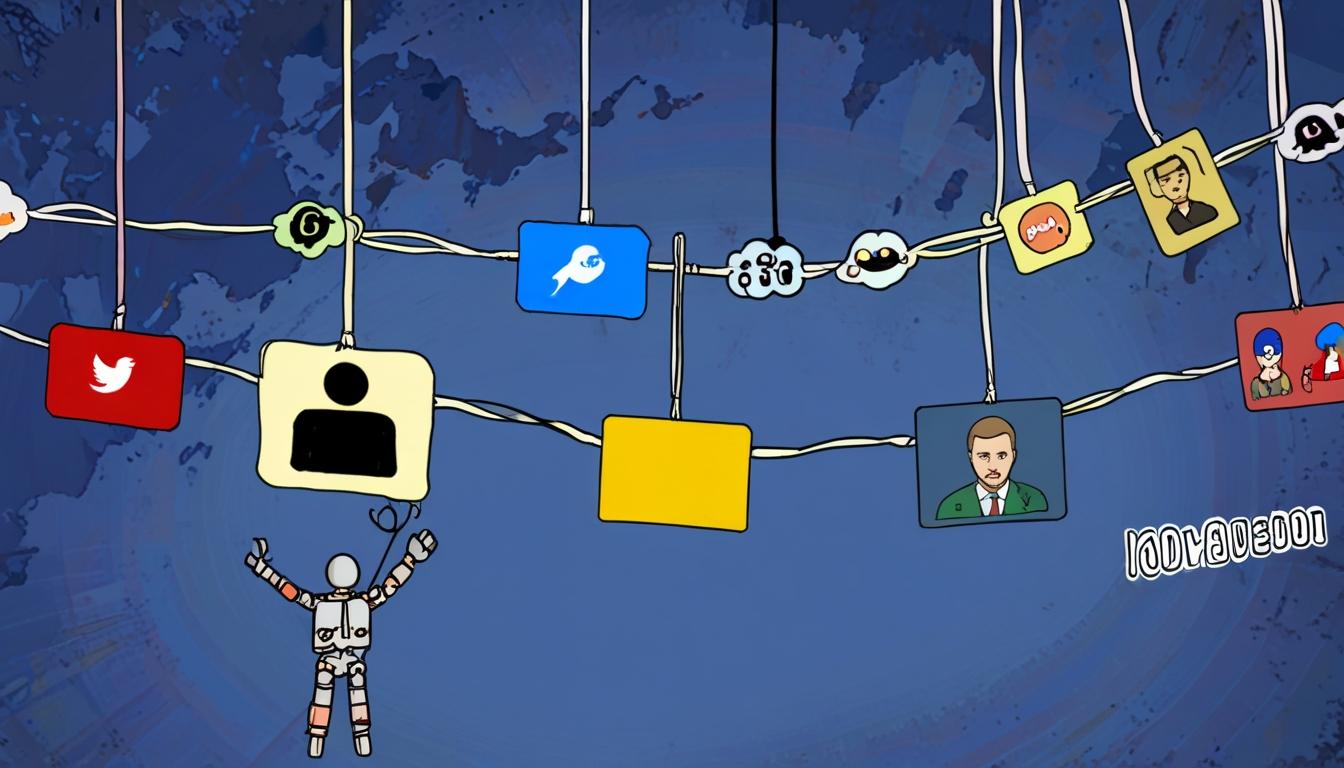A new report reveals how Russia has intensified its sophisticated disinformation tactics, employing over 100,000 fake social media accounts and AI-generated content to distort narratives around the Ukraine war, while Ukraine’s leadership maintains strong public support despite Kremlin’s efforts.
The Rising Tide of Russian Disinformation in the Ukraine Conflict
As the conflict in Ukraine drags into its fourth year, a comprehensive report has unveiled alarming insights into Russia’s expansive disinformation strategy. Central to this campaign is the systematic manipulation of social media, with official sources asserting that more than 100,000 Russian accounts are dedicated to crafting and disseminating misleading narratives about the war. This report, produced by the Global Rights Compliance and The Reckoning Project, highlights the Kremlin’s calculated use of these platforms to obscure its military actions and divert accountability for international crimes.
The Kremlin’s approach to disinformation has not only been expansive but increasingly sophisticated. The report identifies military bloggers, known colloquially as “voyenkors” or “Z-bloggers,” as pivotal players in this narrative construction. These bloggers have an estimated global audience of around 10 million, serving as significant conduits for the dissemination of false narratives. Their influence is illustrated by the coverage of tragic events, such as the March 2022 Russian attack on a drama theatre in Mariupol, which was framed as a “provocation” by Ukraine intended to lure NATO into the conflict. Disturbingly, some military bloggers propagated this false narrative mere days before the incident occurred. Such examples underscore the Kremlin’s strategy of creating “information alibis”—pre-emptive falsehoods designed to deflect blame away from its actions.
Further scrutiny of Russia’s disinformation model reveals a multi-platform approach, heavily reliant on popular apps like Telegram and TikTok. An analysis by the Atlantic Council noted how 2023 saw an escalation in the use of inauthentic networks and document forgery tactics to undermine Ukraine’s credibility. This shift highlights the necessity for robust global democratic responses in countering such malign influences. While Russia has leveraged social media to spread discord within Ukraine, the international community continues to grapple with the implications of these tactics, emphasising the urgent need for a unified stance against disinformation.
In addition to conventional disinformation, technological advancements have augmented Russia’s capabilities. The “Doppelganger” influence operation, reported by multiple sources, utilises advanced techniques such as deepfakes and fake news websites to target a variety of demographics, including key audiences in the U.S. and Germany. This campaign not only aims to disseminate unfounded criticisms regarding the U.S. military and societal issues in Germany but also amplifies anti-LGBTQ+ sentiment and disparages Ukraine’s position. The use of generative artificial intelligence in crafting fabricated articles signifies a troubling evolution in these tactics, promising even more sophisticated avenues for misinformation in the future.
The implications of such disinformation efforts extend beyond immediate military objectives; they aim to destabilise the foundational tenets of Ukrainian society. Reports reveal that the Kremlin has employed Telegram channels mimicking official Ukrainian communications to spread fabricated information, including erroneous narratives about Ukraine’s ‘denazification’ process. This manipulation is not limited to occupied territories but is also directed at undermining the collective resolve of the Ukrainian populace, attempting to sway public sentiment against their leaders and military.
Nevertheless, despite these intense disinformation campaigns, the resilience of Ukrainian society has shone through. Opinions polls indicate that the approval ratings of President Volodymyr Zelensky and General Valerii Zaluzhnyi remain robust, reflecting a united public front in the face of adversity. This tenacity highlights not only the potential ineffectiveness of the Kremlin’s tactics but also the inherent strength of the Ukrainian democratic spirit.
In conclusion, as evidenced by a growing body of reports and analyses, the scale and intricacy of Russia’s disinformation efforts pose significant challenges not just for Ukraine but for global democratic values. Understanding these tactics is key to developing effective countermeasures and preserving the integrity of truthful discourse in an age where information can be both a weapon and a shield.
Reference Map:
- Paragraph 1 – [[1]](https://www.express.co.uk/news/world/2052100/russia-blogger-army-cover-up-warfare), [[2]](https://www.atlanticcouncil.org/in-depth-research-reports/report/undermining-ukraine-how-russia-widened-its-global-information-war-in-2023/)
- Paragraph 2 – [[1]](https://www.express.co.uk/news/world/2052100/russia-blogger-army-cover-up-warfare), [[6]](https://www.washingtonpost.com/world/2024/02/16/russian-disinformation-zelensky-zaluzhny/)
- Paragraph 3 – [[2]](https://www.atlanticcouncil.org/in-depth-research-reports/report/undermining-ukraine-how-russia-widened-its-global-information-war-in-2023/), [[3]](https://www.thehackernews.com/2023/12/russias-ai-powered-disinformation.html)
- Paragraph 4 – [[4]](https://freedomhouse.org/country/ukraine/freedom-net/2023), [[5]](https://link.springer.com/article/10.1140/epjds/s13688-023-00414-5)
- Paragraph 5 – [[1]](https://www.express.co.uk/news/world/2052100/russia-blogger-army-cover-up-warfare), [[6]](https://www.washingtonpost.com/world/2024/02/16/russian-disinformation-zelensky-zaluzhny/)
- Paragraph 6 – [[2]](https://www.atlanticcouncil.org/in-depth-research-reports/report/undermining-ukraine-how-russia-widened-its-global-information-war-in-2023/), [[7]](https://www.npr.org/2024/06/06/g-s1-2965/russia-propaganda-deepfakes-sham-websites-social-media-ukraine)
Source: Noah Wire Services
- https://www.express.co.uk/news/world/2052100/russia-blogger-army-cover-up-warfare – Please view link – unable to able to access data
- https://www.atlanticcouncil.org/in-depth-research-reports/report/undermining-ukraine-how-russia-widened-its-global-information-war-in-2023/ – This Atlantic Council report examines Russia’s expanded information warfare tactics in 2023, focusing on the use of social media platforms like TikTok and Telegram to disseminate disinformation. It details how Russia employed coordinated inauthentic networks, hacking, and document forgery to undermine Ukraine’s reputation and sow discord within Ukrainian society. The report highlights the Kremlin’s efforts to control domestic information and spread false narratives to weaken Ukrainian resolve, emphasizing the need for global democratic values to counter such malign influence.
- https://www.thehackernews.com/2023/12/russias-ai-powered-disinformation.html – This article discusses Russia’s ‘Doppelganger’ influence operation, which targets Ukrainian, U.S., and German audiences through inauthentic news sites and social media accounts. The campaign aims to amplify content that undermines Ukraine and propagates anti-LGBTQ+ sentiment, U.S. military competence, and Germany’s economic and social issues. The operation utilizes advanced obfuscation techniques, including manipulating social media thumbnails and strategic website redirects, and likely employs generative artificial intelligence to create inauthentic news articles, showcasing the evolving tactics in information warfare.
- https://freedomhouse.org/country/ukraine/freedom-net/2023 – Freedom House’s 2023 report on Ukraine highlights Russian efforts to manipulate public perception of the war by creating Telegram channels that mimic Ukrainian government officials’ channels to spread disinformation. It details how Russian authorities disseminate fabricated information targeting Ukrainians in occupied territories, including false narratives about the ‘denazification’ of Ukraine. The report also discusses the use of social media platforms like Facebook and Telegram to circumvent information blocking in Ukraine, with Facebook and Telegram becoming the most popular channels for Kremlin supporters.
- https://link.springer.com/article/10.1140/epjds/s13688-023-00414-5 – This study analyzes the spread of pro-Russian support on social media during the 2022 invasion of Ukraine. It collected 349,455 messages from Twitter, finding that pro-Russian messages received approximately 251,000 retweets, reaching around 14.4 million users. The study also reveals that bots played a significant role in disseminating pro-Russian messages, with 20.28% of spreaders classified as bots, most created at the beginning of the invasion. The findings suggest a large-scale Russian propaganda campaign on social media and highlight new societal threats originating from it.
- https://www.washingtonpost.com/world/2024/02/16/russian-disinformation-zelensky-zaluzhny/ – This Washington Post article exposes a Kremlin-led covert disinformation campaign aimed at undermining Ukrainian President Volodymyr Zelensky and General Valerii Zaluzhnyi. The campaign involved thousands of social media posts and fabricated articles created by troll farms, attempting to exploit rumored tensions between the two leaders. The Kremlin’s objective was to destabilize Ukrainian society by discrediting its military and political leadership. Despite these efforts, Ukrainian society remained remarkably united, with Zelensky’s approval ratings remaining high, indicating the resilience against such disinformation tactics.
- https://www.npr.org/2024/06/06/g-s1-2965/russia-propaganda-deepfakes-sham-websites-social-media-ukraine – NPR reports on Russia’s ‘Doppelganger’ operation, which has impersonated news outlets like The Guardian, Der Spiegel, The Washington Post, and Fox News, as well as NATO, the Polish and Ukrainian governments, the German police, and the French Foreign Ministry. The operation includes fake accounts, phony websites, and purchased Facebook ads targeting French and German audiences with messages about aid to Ukraine, farmers’ protests, and the war in Gaza. In March, the U.S. Treasury sanctioned two Russian companies behind Doppelganger—Social Design Agency and Structura—for conducting the campaign at the direction of the Russian Presidential Administration.
Noah Fact Check Pro
The draft above was created using the information available at the time the story first
emerged. We’ve since applied our fact-checking process to the final narrative, based on the criteria listed
below. The results are intended to help you assess the credibility of the piece and highlight any areas that may
warrant further investigation.
Freshness check
Score:
8
Notes:
The narrative references recent events and reports from 2023 and 2024, suggesting that the information is generally up-to-date. However, some specific details might be from earlier analyses.
Quotes check
Score:
0
Notes:
There are no direct quotes in the narrative provided.
Source reliability
Score:
7
Notes:
The Express is a well-known publication, but it can have sensational or biased reporting. References from other reputable sources like the Atlantic Council enhance credibility.
Plausability check
Score:
9
Notes:
The claims align with well-documented strategies of Russian disinformation and media manipulation, making them highly plausible.
Overall assessment
Verdict (FAIL, OPEN, PASS): OPEN
Confidence (LOW, MEDIUM, HIGH): MEDIUM
Summary:
The narrative is generally plausible and refers to recent events, but its reliability could be strengthened by more specific sources or direct quotes. The use of multiple sources helps to support the claims about Russian disinformation efforts.













